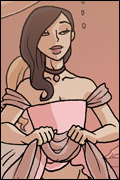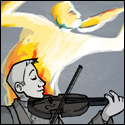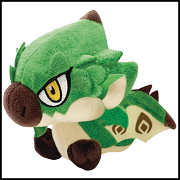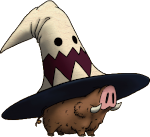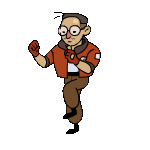|
slydingdoor posted:It's not insane, it's just a gross ego stroke for the GM. "Mmmyeah, I'm the decider of when a fight is over! My monsters will live long enough to do what I want, and die exactly when I think the players have done enough cool to amuse me and/or have sated their own thirst for fun, which I too am the judge of!" That poo poo is the worst. You mock this idea, but isn't that exactly the stated role of the GM? Not just in combat, but in everything. You are the decider of when an encounter is over, or when new dangers come in, or when to keep the story moving. That's literally what the GM does! Having a concrete HP number to knock through but only for combat encounters is kind of asymmetric. The 'monsters without HP' you mention are great, because they encourage the players to make openings and position themselves creatively and bring down the monsters in narratively cool ways. Why don't we just do that for every monster? (interestingly, Blades in the Dark takes the opposite approach, and instead gives everything HP, even non-combat encounters and obstacles as abstract as "the mansion's security" or "the Governor's patience") I'm also confused because the things you said immediately prior in your post seem to contradict it and broadly agree with what I'm saying: slydingdoor posted:I'd go even further than that and say don't even compare anything or anyone's HP and damage, just stop caring about it. Remove it from your mind. Shoehorning in the burden of preparing "balanced combat encounters" is fighting the system, and as in all games doing that will just give you anxiety. Part of what makes GMing this game fun is not having to "fix" the trap character choices or nerf the overpowered monster abilities or bemoan the stupid CR system and tinker with every statblock out of fear that it has too high a DC or attack bonus or whatever, to make sure each fight "counts" and is "fair."
|
|
|
|

|
| # ? Jun 6, 2024 09:44 |
|
The trick to making your encounters challenging regardless of party is the same as making them interesting. Effects and narrative stuff. Make your zombies belch poison clouds, make your orcs use heavy shields and traps, give your dragon napalm breath and use all of this stuff a lot. Always be looking for places for something other than "the monster attacks you". There's a cool story out there somewhere called the 12HP dragon, that talks about how this approach to encounter design makes things much more fun, challenging and interesting. Edit: also environmental effects. Nemesis Of Moles fucked around with this message at 00:11 on Mar 14, 2016 |
|
|
|
Boing posted:You mock this idea, but isn't that exactly the stated role of the GM? Not just in combat, but in everything. You are the decider of when an encounter is over, or when new dangers come in, or when to keep the story moving. In many games this is the case, but in Dungeon World the player moves explicitly wrench narrative control away from the GM. If the Fighter's Bend Bars, Lift Gates move triggers and the Fighter rolls a 10+, the GM does not get to say "Well, this wall is too heavy even for you: sorry, no." I like relying on dice falling the way they do to tell a story, because often the dice will not tell the story you or any of the players is expecting, and rolling with the punches when the dice throw something unexpected your way is where a lot of the best and most memorable stories come from.
|
|
|
|
Yeah, that's true to an extent, but there's also a limit to how far "hahaha man nobody can roll above two damage tonight" stretches before it turns into "Jesus Christ it's 1 AM I'm not having fun any more"
|
|
|
|
Rolling 1 damage on 10+ can just mean you hit a vital area and crippled the enemy without killing it. Take away the enemy's use of weapons, limbs, make it disoriented, whatever.
|
|
|
|
quote:The GM’s agenda, principles, and moves are rules just like damage or stats or HP. You should take the same care in altering them or ignoring them that you would with any other rule. That's the difference between not thinking about encounter balance--an imported, metagame concept--and rigorously following the fundamental rules of monster stats etc. Saying "ignore concepts and 'rules' that don't exist in the system" is completely consistent with "and follow all the concepts and rules that are in the system." Boing posted:Having a concrete HP number to knock through but only for combat encounters is kind of asymmetric. The 'monsters without HP' you mention are great, because they encourage the players to make openings and position themselves creatively and bring down the monsters in narratively cool ways. Why don't we just do that for every monster? Monsters without HP and armor only lack those stats because they can't have those stats--they can't be damaged. Just like why no monster has ability scores. They can't make the PC moves that require those stats, and generate their HP based on tags based on the fiction, not on class and constitution. They absolutely don't lack HP and armor because they're the monsters that the GM gets to decide when or whether they're defeated ie after you solve their puzzle or sit through their cutscene or summon their DMPC. Whether a monster has stats shouldn't make it any more or less interesting or satisfying to fight or run. They all have tags and instincts and make moves, and as the rules say "no self-respecting monster just stands still for their beating. Combat is a dynamic thing with creatures moving in and out of range, taking cover, and retreating. Sometimes the battlefield itself shifts. Have your monsters take action that the players will react to. Make sure you’re making use of moves beyond deal damage, even in a fight." Like Nemesis of Moles said, embrace the fantastic, give each monster life. quote:static damage In game, this is what DW has to say about house rules--this one, in fact. quote:Moves can also change the basic structure of the game. Consider this one, to avoid the use of damage dice: I also think the "disconnect" between a really high move roll and really low damage roll shouldn't be a problem if everyone's bought in to DW, and when those disparate rolls happen, they give everyone more to work with. I don't see how it "breaks up" the narration. It's not as though anyone narrates the attack hitting before rolling the damage, that's against the rules anyway. Maybe you mean it breaks immersion or verisimilitude? It's a game, about fantasy and adventure, daring and riches. Also there's no bonus for rolling boxcars, a 10 is the same as a 15 unless there's a move that changes that, like Evasion, but like Arctic Bunny said, any amount of damage can have tags, or fictional consequences if the trigger included something from which they would follow. If they aimed for the eye, rolled an 11, did 1 damage, the eye is blinded by blood from a cut above it. If it was messy damage, the eye is gone. You also lose chances to go back to the fiction, ask questions and use the answers. When everyone buffs a guy up with Arcane Art and Magic Weapon and Serpent's Tears and they roll a 16 hack and slash... and deal like 3 damage, or the last enemy fighting to the death, just can't seem to take damage from anyone, ask why? You can't make moves, because they're not failing the rolls. How could you have pulled off an attack so perfectly, with all the arcane divine and underhanded advantages and still fail to defeat your enemy? No one could have predicted this but you were at ground zero and know exactly why and what happened, tell us. The player could come up with anything. Maybe the teacher who taught them that move, maybe even a parent, was a sham. Maybe they held back for some reason. Maybe a god or a rival deflected the blow, or someone threw themselves in front of it. Use what the player answers.
|
|
|
|
Whybird posted:In many games this is the case, but in Dungeon World the player moves explicitly wrench narrative control away from the GM. If the Fighter's Bend Bars, Lift Gates move triggers and the Fighter rolls a 10+, the GM does not get to say "Well, this wall is too heavy even for you: sorry, no." The fighter doesn't get to decide that the move triggers, the GM does. If it's an obstacle that can't be destroyed, then the fighter can't "use pure strength to destroy an inanimate obstacle". It's the same way someone might try to Spout Lore about something and the GM might want it to be a total mystery, they don't have any "accumulated knowledge" to go through so the move doesn't trigger.
|
|
|
|
Bear Enthusiast posted:The fighter doesn't get to decide that the move triggers, the GM does. If it's an obstacle that can't be destroyed, then the fighter can't "use pure strength to destroy an inanimate obstacle". It's the same way someone might try to Spout Lore about something and the GM might want it to be a total mystery, they don't have any "accumulated knowledge" to go through so the move doesn't trigger. I have an issue with the "you can't do that, it doesn't happen" approach. If you just throw that down without weaving it into the current game's narrative then you shut everything down. Let's use your examples. Fighter says they are pretty strong and rolls a 10+ to break the unbreakable. It would be a good opportunity to throw in a move and say something like "As you wrestle with the object, you do your best to smash it. At one point you simply smash the orb into the wall over and over until the wall itself gives way and you reveal a hidden passage." Wizard tosses out a spout lore about the big mystery. "The wizard racks his brain about the situation and he remembers something he heard in passing at the wizard bar...<insert plot lead>" You never want to tell a player NO and invalidate their agency. You also want to maintain suspension of disbelief. Striking a fine balance between total random chaos and rigid DM control will keep the narrative flow going.
|
|
|
|
Arkanomen posted:I have an issue with the "you can't do that, it doesn't happen" approach. If you just throw that down without weaving it into the current game's narrative then you shut everything down. Let's use your examples. That's definitely a more elegant way to handle it, just segue them into a different move basically. It's still letting them succeed, just not on the move they were trying to trigger.
|
|
|
|
Draw maps, leave blanks. If the fighter wants to bust down a wall, let them into another area or improvise up a new area if it's conceivable. If you need help you have choices: call for a break and come up with something, ask and use the answers--make the players come up with something--or just reveal an unwelcome truth: you can't just break the Ring with your ax, or your tunnel leads nowhere. They still made a tunnel, and could come up with a way to make use of it--patrols likely won't expect there to be a new tunnel around, it could trick them into investigating or leading the party to their commander, or maybe the fighter picked "you can fix it again without a lot of effort and they could get in and patch up the entrance to make a safe space that everyone could hide in to bypass a patrol, or Make Camp.
|
|
|
|
I ran a "standard" fantasy Dungeon World one-shot back in the day, and thought it was awesome. I now want to run a game in the Crimson Skies universe, where each character is an ambassador from a different non-American country (think sort of Babylon 5 where "ambassadors" might be warriors, spies, diplomats or pilots depending on the needs of the plot), with the grand aim of bringing the Americans into the war against Nazi Germany. This presents some problems: 1. How do you make Dungeon World appropriate for real-world 1937? 2. What playbooks are best for characters from this time period? 3. What are some good resources for the world of Crimson Skies, particularly the non-American bits? Gort fucked around with this message at 19:47 on Mar 25, 2016 |
|
|
|
Gort posted:3. What's are some good resources for the world of Crimson Skies, particularly the non-American bits? If you can get your hands on a copy of Crimson Skies: Airman's Gazetter, that has some info on other countries in the CS universe (although it is still mainly US-centric). There is a small amount of info on other nations here. You may get some ideas at the CS forum. Some nice 1938 "fanon" atlas info here. If you are not married to DW, there are other systems that might work. Spirit of the Century is full on Pulp, which could fit the genre as written and Fate Core has Kriegszeppelin Valkyrie, which is a setting along the lines of dieselpunk meets Battlestar Galactica. There are a couple of Crimson Skies hacks for Savage Worlds here and here. I have not played Warbirds, but it might fit the bill.
|
|
|
|
Gort posted:I ran a "standard" fantasy Dungeon World one-shot back in the day, and thought it was awesome. Obviously, you want to focus on non-magic playbooks, although you can work on some other stuff as weird, pulp science like the Artificer, Golem, etc. Some examples. The Assassin - A stealthy killer. Unlike D&D, he need not be evil; he may be a killer for a just cause. The Bombardier - Master of Boom. The Captain - You command the crew of an Airship. The City Thief – A burglar whose skills lean more towards urban operations. The Charlatan – A con artist with a splash of stage magician. The Convict – A hardened ex-criminal, leveraging skills he learned on the inside. The Dashing Hero – A suave, debonair duelist with a paramour in every port. The Fighter – The workhorse of martial characters. Lethal with any weapon. The Leader – A warrior who specializes in tactics and helping his group succeed. The Marksman – A legend with ranged weapons. The Medic – An accomplished physician, field surgeon, and the best healer you can get without magic. The Merchant Prince - Money talks and an expert in the art of the deal. The Mountebank – A master of social combat and ferreting out information. The Noble – You were born into privilege, and now you slum for excitement. The Ranger – A soul at home in the woods, a consummate tracker and survivalist. The Samurai – An honorable warrior from the land of the Rising Sun. The Street Rat – Connected, streetwise, and fleet-footed. The Swashbuckler – Adventurer with a sharp sword and even sharper wit. The Templar – You root out heretics and any who dare oppose your faith. The Thief – A scoundrel and ne’er-do-well at home, at home in a city or dungeon.
|
|
|
|
A few friends want to try Dungeon World sometime, and I'm interested in learning to DM for it. I know the book has a guide to DMing in general, but is there an up-to-date best practices guide out there too? How does the DMing approach change as the game length changes (e.g. one-session one-shots vs. sprawling epics vs. everything in between)? I've never actually played DW before or DMed anything before, is it a bad idea to cut my teeth on both at the same time?
|
|
|
|
Going off of the earlier monster HP discussion, how do other PBTA games handle it? Obviously that's stepping outside the written rules of DW, but are there like "wounded states" for enemies in, say, Apocalypse World?
|
|
|
|
gradenko_2000 posted:Going off of the earlier monster HP discussion, how do other PBTA games handle it? Obviously that's stepping outside the written rules of DW, but are there like "wounded states" for enemies in, say, Apocalypse World? Apocalypse World has most npcs going down in one hit (and pcs going down in 2 or 3), as does Monsterhearts. I don't know how a lot of other games do it, especially not combat focused ones. Fellowship has monsters with stats that give them special abilities, conflict is in wearing down those abilities steadily or dealing a decisive hit.
|
|
|
|
Pollyanna posted:A few friends want to try Dungeon World sometime, and I'm interested in learning to DM for it. I know the book has a guide to DMing in general, but is there an up-to-date best practices guide out there too? How does the DMing approach change as the game length changes (e.g. one-session one-shots vs. sprawling epics vs. everything in between)? I've never actually played DW before or DMed anything before, is it a bad idea to cut my teeth on both at the same time? As far as I know, this guide linked in the OP's second post is still the best collection of advice.
|
|
|
|
Pollyanna posted:A few friends want to try Dungeon World sometime, and I'm interested in learning to DM for it. I know the book has a guide to DMing in general, but is there an up-to-date best practices guide out there too? How does the DMing approach change as the game length changes (e.g. one-session one-shots vs. sprawling epics vs. everything in between)? I've never actually played DW before or DMed anything before, is it a bad idea to cut my teeth on both at the same time? I'd say starting in DW without having bad habits to unlearn from other systems might be a real boon. You're taught to be a fan of the characters and that antagonistic behavior between the GM and players isn't conducive to having a good time. In short, you'll be fine. You might be better off for it, in fact.
|
|
|
|
Dungeon World is the first thing I GM'd, and I'm glad for that. My only advice is, if you're not very good at improv, do a lot more prep than the guides suggest, but keep it very open. Like a table of encounters that can happen at whatever possible place the characters end up, rather than a set story. Come up with a bunch of NPC's ahead of time, names of places, cool loot etc, just don't shoehorn any of it in, prepare for 90% or more of your prep never seeing the light of play. Give life to the bad guys, give them motivations, remember that they're not sacks of stats to throw at the PC's, and that a clever enemy is far more frightening and engaging than one with a big attack value and +3 armor.
|
|
|
|
gradenko_2000 posted:Going off of the earlier monster HP discussion, how do other PBTA games handle it? Obviously that's stepping outside the written rules of DW, but are there like "wounded states" for enemies in, say, Apocalypse World? Apocalypse World applies harm evenly to PCs and NPCs, though a) harm is nonrandom and b) most NPCs clock out at 2-harm. Their response to various harm states is narratively defined.
|
|
|
|
MANIFEST DESTINY posted:My only advice is, if you're not very good at improv, do a lot more prep than the guides suggest, but keep it very open. Also, don't be afraid to say "I need a moment to think about that" or call a coffee break if your players do something that throws you completely off your game. Or canvas them for ideas! You don't have to have all the answers, all the time.
|
|
|
|
potatocubed posted:Also, don't be afraid to say "I need a moment to think about that" or call a coffee break if your players do something that throws you completely off your game. Or canvas them for ideas! You don't have to have all the answers, all the time. Yeah, remember you can turn a question back on them. Jake, playing Grimm Crabtree: "We've broken into the super-secret goblin vault; what do we see?" GM: "Well, having been adventurers for so many years, you've all gotten to know goblins pretty well. Grimm, what do you think the goblins have in such a well-guarded vault?"
|
|
|
|
Just roll on the treasure table for that stuff. If no one's foreshadowed a particular reward, there's no need to disclaim responsibility for goblin hoards. Otherwise I find when asking a question of the PCs, make it detailed "a scroll, what's it say?" or "something bright blue sticks out among the meager offerings," and don't make it super open ended unless you've got the read on that player or cleared in advance that kind of narrative responsibility and they said they're up to it. Don't do multiple choice questions either, this will paralyze completionists something fierce, whether they're the one addressed or not. Calling for the break is best when you tell everyone to speculate about it a little while they nosh. Or know that they will whether you tell them or not. From here on I'm mostly paraphrasing this 20 minute thing. The funny thing about prepping because you're afraid of having to improv is that it can backfire and make you more anxious in and before play as you think about all that ending up being worthless or not being enough. 90% worthless prep won't make you feel better when 10% of the prep that's worth it keeps you afloat for 10 minutes. What you should do is Isolate what you're most afraid of loving up: random npcs, setting stuff, physics stuff, map stuff, rules stuff, etc. and knock them out one by one with specific prep. Drilling, in some cases. If you're afraid of random npc names and traits, get some lists and practice picking them and introducing them in the fiction through actions. Setting stuff? Write short descriptions of the tone and themes of the game, the aesthetic you like about it and are trying to convey in the fiction. Touchstones. Physics stuff? Google how much a marble statue or ostrich or horse or whatnot weighs or its size or whatever, then think about what that means in the fiction. Map stuff? read a little geology and read about caving or mines or jungles or whatnot. Also do the Touchstones thing. Rules stuff is the easiest. Read the rules and think about their application and triggers and such, that way you'll know how to nudge the players into triggering the move they want and how to make monsters on the fly and how to quickly roll on the treasure table and stuff. Especially use the rules on fronts and dangers. Really really do not ignore them. The best thing about prepping this way is it will make you a better GM, especially in DW, not just one more prepared for this particular session. Not just one with a shallow bag of tricks that might not even serve them this session or ever.
|
|
|
|
I'm going to be running a game based on the setting in Hyper Light Drifter, because it's awesome and I love everything about it. Basically, a verdant post-apocalypse with ruins full of ancient neon laser technology. I pitched it to my group as "Neon Laser Fantasy" and they were all-in. Here's a video of the game if you're not one of those videogamesters: https://www.youtube.com/watch?v=Qzb6ZPpWi3c Anyone know some good playbooks that would fit in for stuff like this? I know a lot of the Inverse World ones would work well, but I'm curious if there are any good "device magic" sort of playbooks that I should work in, or particularly well-made treasure hunter or ruins-explorer themed playbooks.
|
|
|
|
Pollyanna posted:A few friends want to try Dungeon World sometime, and I'm interested in learning to DM for it. I know the book has a guide to DMing in general, but is there an up-to-date best practices guide out there too? How does the DMing approach change as the game length changes (e.g. one-session one-shots vs. sprawling epics vs. everything in between)? I've never actually played DW before or DMed anything before, is it a bad idea to cut my teeth on both at the same time? I'm a pretty novice GM, but the first game I ran was Tremulus, then Apocalypse World, then Dungeon World. I think Apocalypse World is a really good read for understanding the system. Most of the other books assume you get certain concepts from AW that aren't entirely obvious. Another helpful thing would be watching one of the videos where the creator of Dungeon World GMs a game, search it on YouTube.
|
|
|
|
I've committed a sequence of GM sins and I'd like to know how (or if) there's a way to restore order. I forgot to do worldbuilding first session and had the players running around a pretty distinctive industrial magic city full of gnomes that I pulled out of an adventure I found online. I hate gnomes. This world really didn't sit well with me either. I asked the players if it was alright if we spent a session worldbuilding after they'd finished the first dungeon so we played a game of Microscope with dungeon world's requirements in the palette. I didn't put in the requirements of our own world. The world we came up with (The races have been driven below ground by city sized sentient titans they used to live on) doesn't mesh with what we've done at all, but it's hype as gently caress. I don't want to ask them to ditch their characters, nor do I want to ditch the kickass new world. My current best solutions are either a janky "it was all a dream!"-style transition or asking them if they'd like to roll up new characters that are part of the world. That gives them the option to keep their character if they'd like and we try to tie the knot of loose ends into a messy lore bow. Anybody got any better solutions? Macdoo fucked around with this message at 23:04 on Apr 3, 2016 |
|
|
|
|
Macdoo posted:I've committed a sequence of GM sins and I'd like to know how (or if) there's a way to restore order. I forgot to do worldbuilding first session and had the players running around a pretty distinctive industrial magic city full of gnomes that I pulled out of an adventure I found online. I hate gnomes. This world really didn't sit well with me either. I asked the players if it was alright if we spent a session worldbuilding after they'd finished the first dungeon so we played a game of Microscope with dungeon world's requirements in the palette. I didn't put in the requirements of our own world. Could you have them role play out the giant titans driving everyone underground? Like the heroes rise from their first dungeon, everyone is all chill, then in the far off lands, some evil forces complete a secret ritual which unleashes these beings upon the world. The city has a shelter for these occasions, and your players help the city's people get to it. Little does everyone know, the shelter is built into a vast array of tunnels that criss-cross the entire world.... I just finished a game that had kind the opposite - very non-standard fantasy, large world tree made of mountain-sized dragons which descended down onto the world in an immense apocalyptic cluster gently caress. Fun times.
|
|
|
|
If you made an out-of-game mistake, don't jump through hoops trying to make an in-game solution. Just say you messed up, and offer to have a do-over and keep whatever parts you collectively like. There's no need to dress it up in the veneer of a dream sequence or whatever.
|
|
|
gradenko_2000 posted:If you made an out-of-game mistake, don't jump through hoops trying to make an in-game solution. Just say you messed up, and offer to have a do-over and keep whatever parts you collectively like. There's no need to dress it up in the veneer of a dream sequence or whatever. Very true. I'll get asking and see what we're gonna do next. Cheers.
|
|
|
|
|
It's perfectly possible to retcon it as a weird pilot episode that simply introduced your characters. Don't sweat it, jump straight into the next one with the same crew and have them not mention the sudden shift at all?
|
|
|
|
Hey so, I'm super new to Dungeon World (working on my second session of my first game) and I've given my party a fairly powerful item (a Cowl that bends wills) that will be of some significance to the campaign. Now, I think they're going to give it up but (a) I'm not going to railroad them into doing so and (b) I expect it to come back eventually, so I don't want it to be too game-breaking. But I'm having some trouble coming up with a good move for it. This is what I have right now: Cowl of Dominance At the beginning of an encounter, draw on the thoughts and emotions of those around you and roll +CHA 10+ hold 3 7-9 hold 1 6- describe the emotional blowback that tears through your mind and stuns you During the encounter you can spend one hold to either (1) give a short command to one person or monster that it must obey to the best of its abilities for its next action, unless obeying it would put it in clear danger or (2) learn something you didn't know about a being of your choice. Any thoughts? I'm thinking of adding a narrative blowback to the 7-9 but I'm not sure what it would be.
|
|
|
|
admanb posted:Hey so, I'm super new to Dungeon World (working on my second session of my first game) and I've given my party a fairly powerful item (a Cowl that bends wills) that will be of some significance to the campaign. Now, I think they're going to give it up but (a) I'm not going to railroad them into doing so and (b) I expect it to come back eventually, so I don't want it to be too game-breaking. But I'm having some trouble coming up with a good move for it. This is what I have right now: How about... When you use the Cowl to draw on the thoughts and emotions of those around you, roll +Cha. On a hit choose a nearby person or monster and choose one: either give them a sudden, innocuous impulse which they will act on as soon as possible; or the GM will tell you something about them you didn't already know. On a 7-9, the GM holds 1.They may spend this hold at any time to have your character experience a sudden wave of intense emotion or a memory not their own, or to make you act on an emotional impulse. On a miss, the GM holds 1 in addition to anything else they say. It's not super-elegant -- I don't like giving the GM hold to track -- but it makes the cowl a thing you have to use a lot to make the most use of its power, while simultaneously setting you up to make terrible decisions in the future. I also changed 'command' to 'impulse'. An impulse is subtler, but also fleeting -- the duration is kind of built into the word choice -- and it theoretically affects anything with a mind, which is potent. On the other hand, while you can control what flickers across someone's mind you lose control of precisely how they act.
|
|
|
|
potatocubed posted:How about... Elegant. I love it. Word choice can do so much in dungeon world.
|
|
|
|
I like that a lot. Thank you!
|
|
|
|
There are no "encounters" in DW, the suggested new trigger is good, but keeping the "cooldown" would mean adding "you can't do this again until it recharges in an hour or so." or "a few hours" or something. Keep the part where the PCs have hold, that plus the "cooldown" section will be a good way to limit the use of the item, which it seems is one of your goals. GM's shouldn't have hold, just say "on a 9- you will at any time hence experience etc." Failing on 6- is inherent to the system, and doesn't need to be referred to.
|
|
|
|
In most cases, I agree that the GM shouldn't have a resource to manage--but this item is meant to be a campaign-defining object of significance. In this case, I'd say it's warranted. Just don't get into the habit of designing DW moves in this way.
|
|
|
|
I want to bring this up in earnest from the Kickstarter thread, and I figured here might be the best place for discussion. A lot of people are saying PbtA games have evolved, which they have. How would people change or even rewrite dungeon world to be a "better" hack, while still emulating that old school dnd or fantasy trope feel?
|
|
|
|
For what it's worth, I've always had trouble "getting" Dungeon World, but I read through cyberpunk PBTA-hack The Sprawl last week and it clicked hard. This is all just armchair designing, but I'd do away with the having to pay homage to the six stats and come up with something better. "Do I use Wis, Int or Cha? How can I justify the use of Con?" is not something I'd like to still wrestle with in TYOOL 2016. I think the last few pages of HP:damage discussion also shows that there are better ways to handle that particular aspect of the game. I mean, 4th Edition D&D already embraced the idea of "a minion always gets killed in 1 hit" and "monsters should probably be dead in four hits, tops" - so you might as well go all-in on the concept. There's a short PBTA hack by John Harper called Ghost Lines that I think hews closer to what I'd expect out of a Dungeon World that's more on the World end of the scale than the Dungeon.
|
|
|
|
Fenarisk posted:I want to bring this up in earnest from the Kickstarter thread, and I figured here might be the best place for discussion. I've been thinking about this, too, since I'm about to start a Dungeon World game based on Nausicaa and Hyper Light Drifter and I'm sort of running up against the idea that, while DW might not be the right system for it, I do want something in the PbtA vein. I don't really have any answers yet but I'm curious to see what other people post about it. gradenko_2000 posted:There's a short PBTA hack by John Harper called Ghost Lines that I think hews closer to what I'd expect out of a Dungeon World that's more on the World end of the scale than the Dungeon. Oh hey, that's pretty cool. You can see some of the genesis of Blades in the Dark in that, too, as I scan the PDF.
|
|
|
|

|
| # ? Jun 6, 2024 09:44 |
|
Harrow posted:Oh hey, that's pretty cool. You can see some of the genesis of Blades in the Dark in that, too, as I scan the PDF. BitD is actually set in the same "universe", even.
|
|
|









